|
Introduction
The match was planned to be of 14 games. It was organized by Viktor Tietz on behalf of Carlsbad Chess Club. The match ran from June 2nd to June 25th, 1902. 1 The venue
Carlsbad (Karlovy Vary) had benefited from the growth of tourism, railways and the fashion for spa cures. "Carlsbad is about eight hours by rail from Berlin and Vienna, and within easy reach of most of the continental capitals. It possesses, perhaps, the best train service of any continental resort. The scene at Carlsbad in the early morning is very curious. As early as four o'clock the first "cure guests" take their stations at the springs, and by six o'clock a huge crowd of, perhaps 10,000 people is assembled. In order prevent confusion they are lined up in single file each of the eighteen springs, and the queues are sometimes nearly a mile in length. Everybody carries little glass fastened on a strap. At a spring a bevy of young girls are in attendance to fill your glasses with the hot water, and it is gratifying to notice that rank or station are of no account. If working man comes before a peer his glass is filled first. Anyone staying in Carlsbad must register his name, address, and occupation, and visitors are divided into two classes — "bathers" and "tourists". If you stay longer than eight days you are considered a bather, and you are noted in the daily renter. You will, also, have to pay small tax, which gives you the privilege of drinking the waters and visiting the concerts free of charge. The season at Carlsbad begins on April 1st and lasts till November; but invalids go all the year round to drink the waters. Drinking constitutes the principal part of the cure, but bathing, exercise, and judicious dieting all play their parts." 2 Carlsbad was fashionable and attracted a rich and cosmopolitan clientele. During the 1902 season it hosted such luminaries as: The Shah of Iran 3, Mr. Elihu Root , the American Secretary of State for War 4, and Congress of Natural Philosophers And Physicians 5 The organizer Chess in Carlsbad benefited from the energy of Viktor Tietz , who as a city councillor convinced his colleagues that this would provoke interest in Carlsbad and promote its reputation as a leading European resort. In 1902 he resigned as a tax inspector and dedicated himself to promoting chess. 6
Dr. Josef Schindler noted in the tournament book of the Braunau (Broumov) Congress (1925): "The ancient, rich spa town on the River Teplá with its vibrant and diverse interests was the appropriate stage for Tietz, the great organizer of chess events. His authority and influence in the public life of the city, as well as his personal relationships, enabled him to obtain money and friends for chess competitions, by which the name of Carlsbad gained a good reputation in the chess world." 7 The "Wiener Schachzeitung” directly attributed the prominence of the city in chess circles to the work and dedication of Tietz 8 "Along with Vienna and Prague, over the past few years Carlsbad has developed to be an equally important Austrian chess centre. It has through its vigorous chess club and its tireless director of the match, Herrn. Senior Tax Inspector Tietz, become a magnet towards which chess master events are powerfully attracted. The Carlsbad Club has shown its support for the great merits of its President, who shuns no sacrifices when it comes to his cherished chess art, by his recent nomination as an honorary member, but the whole larger chess community should also feel obliged to give hearty thanks to this selfless and vigorous promoter of the noble game." 9 His first project had been the Albin-Marco match of 1901 (from July 31 to August 12, 1901) 10, but this was his most ambitious project to date. It was a match between two of the up and coming, grandmasters of the decade, David Janowski and Carl Schlechter. Conditions
The match was played at Carlsbad Chess Club, June 2nd-25th 1902. 11 2. The club met in the Kurhaus (Kaiserbad) Imperial Baths Hotel. 12 The players received 500 Krowns 13
This would be approximately £21, or £2,056.00 in 2015 value 14 Janowski
Janowski and Schlechter, were respectively 4 and 5th on the Chessmetrics rating list for January 1902 15. The period 1898-1914 was Janowski's most successful portion of his career. At the time of this match he was 33 years old. Edo Chess shows him at entering the top ten in 1896 and being 5th in 1902 16 and Chessmetrics has the same assessment 17 Janowski's tournament record up to this match was impressive, the best performances being: Nuremberg (1896), 5th place; 1896 Vienna, first; London (1899), shared 2nd place; Monte Carlo (1901), first; Monte Carlo (1902), 3rd place; and 1902 Vienna, where he shared first. Despite his poor performance in this match, undaunted, he would go on from this match and decisively win the extremely strong 13th DSB Congress, Hanover (1902) (+11 -1 =5), which commenced less than a month later on 21st July. Schlechter
The 27 year old Schlechter was slowly but surely growing in stature as a top player. Schlechter had achieved a solid result at Hastings (1895) (11 out of 21) his play being conservative and careful. He improved upon this with a +3 score at the Nuremberg (1896) tournament and then finished equal fourth at Budapest (1896). He continued steadily along his path towards the chess elite. At Vienna (1898) he finished with 21.5 out of 36; and in London (1899) he scored 17 out of 27. He began to make significant progress in the first decade of the twentieth century. He was first at 12th DSB Congress, Munich (1900). This was followed in 1901 by a 2nd place at Monte Carlo (1901).
Edo Chess has him entering the top 10 in 1896 and by 1902 he is shown to be sixth in the world 18, whilst Chessmetrics shows him as fourth. 19 Despite Schlechter's drawing reputation, and maybe because of Janowski's dislike for draws, their previous games tended to be decisive. Since the 1897 match, they had each won six games and drawn three 5. In June 1902, "Deutsche Schachzeitung" in an analysis of top grandmaster results states +6-8+2 in favour of Janowski since Hastings 1895. 20 Both of the drawn games had been hard struggles. The Match
"JANOWSKI v. SCHLECHTER — After losing a short match of two games with Moritz Porges , Janowski undertook match of fourteen games with C. Schlechter. The latter has been a studious player for some time, and in his earlier days was much on the careful side that he frequently drew his games, and received the title from his opponents the "drawing master". His present match with Janowski proves him to be of a most aggressive style also; and his Monte Carlo performance (1902 - e.d.) makes all players respect him... " 21 This match in simple rating terms was one of Schlechter's greatest achievements, but as a match it suffered from Janowski's dreadful form. The score was unbalanced by Janowski losing two games he should have won, and also making gross errors in the very early middle game. These adversaries had drawn a previous match (=2-2=3) in Vienna, in December 1896. 22 23 Despite Schlechter 's drawing reputation, and maybe because of Janowski's dislike for draws, their previous games tended to be decisive. Since the 1897 match, they had each won six games and drawn three 5. 24 Both of the drawn games had been hard struggles. 25 "News from Vienna, a little (double round - e.d.) master tournament had a surprising result, as Heinrich Wolf and Janowski were first. Incidentally, only one point accounted for the entire difference between top and bottom place." 26 27
Schlechter came in half a point behind the joint winners but had lost both games to Janowski. At Monte Carlo (1902) , Janowski (third equal +13 -4 =4) had again come ahead of Schlechter (sixth with +9 -4 =9). Schlechter had inflicted a severe defeat upon him in only 23 moves - Schlechter vs Janowski, 1902 Progress of the match Game 1 - 2nd June 1902
Game 2 - 4th June 1902
Game 3 - 8th and 9th June 1902
Game 4 - 10th June 1902
Game 5 - 13th June 1902
Game 6 - 15th and 16th June 1902
Game 7 - 17th June 1902
Game 8 - 20th and 21st June 190
Game 9 - 22nd and 23rd June 1902
Game 10 - 25th June 1902
28 29
Janowski had a dreadful start to the match with four successive losses, three of which were in under twenty five moves. Round 1 2 3 4 5 6 7 8 9 10 Total
Schlechter 1 1 1 1 ½ 1 0 ½ ½ 1 7½
Janowski 0 0 0 0 ½ 0 1 ½ ½ 0 2½
<Progressive scores:>Round 1 2 3 4 5 6 7 8 9 10
Schlechter 1 2 3 4 4½ 5½ 5½ 6 6½ 7½
Janowski 0 0 0 0 ½ ½ 1½ 2 2½ 2½
According to Rudolf Spielmann"The match between Schlechter and Janowski in Carlsbad 1902 proved to be amusing. Janowski was most probably a brilliant master who was by then at the height of his fame, but unlike Schlechter he possessed an abrasive personality. He was a choleric and constantly irritated, being a short-tempered and stubborn man. Woe to him who won against Janowski! His opponent would then be showered with a barrage of insults! The match was going in favour of Schlecter. The Carlsbad City Councilor Tietz, a famous chess promoter, tells how Schlechter having won would literally take flight, so that Janowski's angry outbursts always flew into empty air. Janowski's anger had to it a system. His conqueror was the worst example of coffeehouse player, i.e. a club or domino player. Then there was the appropriately hefty amazement as how it had been possible to allow such a duffer into the tournament." 30 Games
Game 1
"In July issues of "Strategie" the first match game Janowski - Schlechter (1. e4 e5 2. Nf3, Nf6 3. Ne5 d6 4. Nf3 Nxe4; 5. d4, d5 6. Bd3, Nc6 7 0-0 Be7 8. Rel, Bg4 9. c3 f5 10. Nbd2) is annotated by S. Alapin . 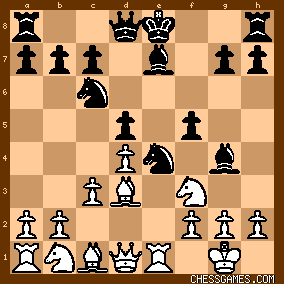
click for larger viewHe justly blames Black's tenth move <10. Nbd2> and comments: "With this weak move White gave away his advantage; the correct continuation was 10 Qb3! 0-0 11 Nfd2 Nxd2 12. Bxd2 Rab8 13. Nfl with decisive advantage..." 31 Schlechter refuted this variation at length in "Deutsche Schachzeitung", No. 8, August 1902, p.233 - 235. On variation runs: 11...Nxf2! 12. Kxf2 Bh4+ 13. g3 f4 14. gxh4 Qxh4+ 15. Kf1 f3 In the actual game, Janowski lost after <12.Ne3?> 
click for larger viewwhich allowed <12.Bxh2!>. "This plausible move is in fact a decisive error; 12. h3 should be played" a DS p.172 32 Game 2
Once again Janowski made a catastrophic blunder by leaving his Rook hanging with <22...Rd6> instead of <22...Rd8> (=). 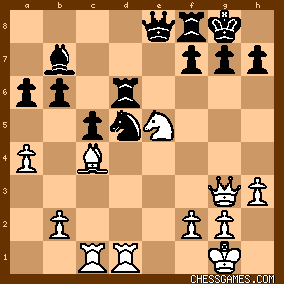
click for larger viewThis allowed Schlechter to play a combination with <23. Nxf7> that whilst not winning outright so demoralised Janowski that he resigned within three moves although there was no outright win for his opponent. Game 3
This was a game that Janowski should have won, but he missed the winning move twice. Janowski played a flowing attack against Schlechter 's French Defence, and his opponent struggled to defend his King on the Queen-side after selecting a poor opening plan (although one later copied by Keres -I V Rohacek vs Keres, 1942 ). 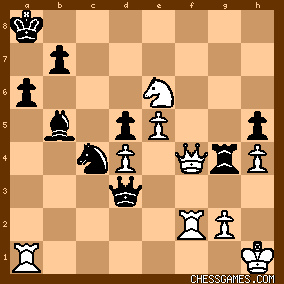
click for larger view44.Nc7 wins; and 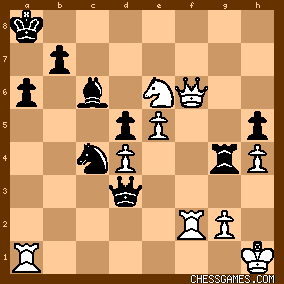
click for larger view45.Rxa6! wins Game 4
Scarcely out of the opening, Janowski let his Queen be trapped and had to resign after only 24 moves. This was probably his worst game of the match. Having missed a win in the previous game, he was 4 - 0 down, and there was little to indicate that he could overcome demoralisation and recover. Game 5
In a Ruy Lopez, Janowski as White played methodically and won a pawn. 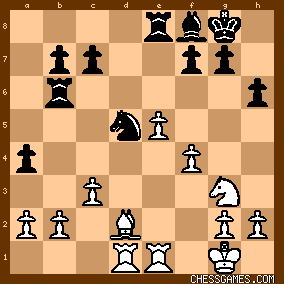
click for larger viewNe4 would have preserved a significant advantage, but after <22. Bc1 a3!>, "This demolishes the White Queen-side completely, in the following interesting endgame the extra pawn is insufficient for White to win" zz 33 Janowski could not win the R+2P against R+P ending. The players' times were : White 3 hours 38 minutes, Black 2 hours 25 minutes - "Wiener Schachzeitung" 1902, p.151. 34 Game 6
Schlechter sacrificed a Knight for three pawns and an attack. There was no clear win and Janowski was still fighting hard into the ending. 
click for larger view
"(22. Nxe6>) A promising, but perhaps not quite correct continuation, although White has three Pawns for the piece. More solid was 22 Qf3" 35 (or even <22. Qxa6> - e.d.) Was this truly a speculative sacrifice, or perhaps he believed he would end up three pawns ahead after <24.Rxd5>? The problem being that Janowski could reply <24...Bf6!> and the White Q is both cruelly exposed her only escape being at the cost of her R on e5. Janowski's technique did not match that of his opponent and Schlechter won two further pawns and the game. Game 7
Janowski's first win of the match, and apart from Game 3, the first game in which he showed his true class. With White in a Ruy Lopez, he had more space and the initiative. "A first-rate treatment of the opening has acquired White an attractive and freer game, Black intends therefore, in similar fashion to the fifth Match game, to sacrifice a pawn to free up his game and obtain a counterattack." 36 Janowski topped off his good play with a winning combination after Schlechter miscalculated by placing his Rook on <d2> thinking was forcing a draw: 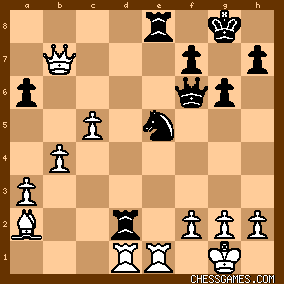
click for larger view28. Rxd2? is drawn after 28...Nf3+ 29. gxf3 Rxe1+ 30. Kg2 Qg5+ 31. Kh3 Qh6+ 32. Kg2 Qg5+ 33. Kh3 Qf5+ but after <28.Bxf7+!!> Janowski soon won. Game 8 A game Schlechter drew in an advantageous position. Being four wins up he could afford such a luxury. He had a Rook for the exchange and a pawn. "Deutsche Schachzeitung"'s final note on move 56 states that: "After a few more moves it was given up as a draw", so there may be a few further moves which have been lost from this game. 37 Game 9
Janowski played aggressively on the King-side as white in a Ruy Lopez. Schlechter carefully equalized. Schlechter, short of time, blundered a pawn but it was still a drawn ending. Janowski naturally attempted to win for a long time. A threefold repetition occurred on Black's 64th and 85th moves. 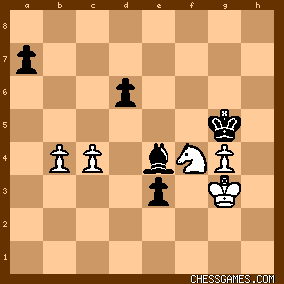
click for larger view"Black did not have the time necessary to calculate all the continuations, <44. Kf6> should have been played;
after the text move (<44. e2>) White wins a pawn, but in spite of his prolonged labours, he cannot penetrate and the game is drawn." 38 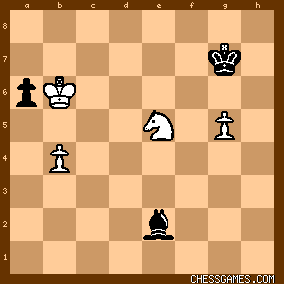
click for larger viewOn White's 89th move, the "Wiener Schachzeitung" commented "Janowski's stubborn efforts to win the game in a match already so unfavourable (6½ - 2½) is comprehensible. But with his following move he could only have hoped only that Black would finally leave his Bishop en prise" 39 The game lasted two session and 7½ hours. 40
Game 10

click for larger view
<Contemporary reaction> Despite Schlechter's overwhelming victory, his achievement was diminished by the poor form shown by Janowski. "Some weeks ago M. Janowski wrote notifying us of his approaching play with Schlechter. His letter was dated Monte Carlo, and it occurred to us at the time that a prolonged stay at the gaming metropolis would not be conducive to good play. Shortly afterwards Janowski went to Prague and lost two games to Porges, and immediately following he began to play with Schlechter, and lost four games straight off. We make these remarks not for the purpose of detracting in any way from the fine performance of Schlechter. That would, indeed, be impossible; but equally as the games show beautiful play by Schlechter, they also show a kind of hopeless apathy resulting presumably from a depressed disposition by Janowski." 41 Consequently, although Schlechter 's stock rose in the chess world, the result did not create such excitement as to cause commentators to suggest it was time for a world championship match. "The match at Carlsbad, between Schlechter and Janowski has been won by Schlechter with a score 7½ wins Janowski's 2½. The Austrian appears much more likely and more dangerous aspirant to championship honours than Janowski, who was threatening Lasker with a match some time ago. Meantime, neither of them appear show the all qualities necessary for success in such a match, and either case Dr. Lasker would no doubt hold his own." 42 Schlechter was praised for a new dynamism considered now to be apparent in his play "The match at Carlsbad between these masters is now concluded, the tenth game...being the deciding one. The winner of the best of fourteen games was to be the victor, and the result of the tenth game gave the score - Schlechter, 7½ wins: Janowski 2½ wins. This result, three to one in favour of Schlechter , must not be taken as the relative abilities of the two masters, for Janowski is evidently capable of doing much better things. Still, Schlechter must receive every praise, for we find him changing his accepted style of cautious and careful play for the bold and aggressive style, occasionally giving up a Pawn, or the exchange, for the prosecution of his attack: and this against such an opponent means much. It is said that Janowski has issued a challenge for a return match which is quite a natural proceeding; but as this match cannot be played till after the completion of the Hanover Tournament, the challenger may have become cooler ere then." "Schlechter and Janowski have concluded their play at Carlsbad. Schlechter is the victor, as obtained the requisite majority of 7½ with the tenth game, his score then being six wins and three draws. The result of the play between these two masters came as a surprise to the chess world. Janowski's play was certainly below his best form, whereas Schlechter played finely throughout. In playing over his games one meets with sparkling ideas and conceptions at every turn. Schlechter thought but little of Pawn, and at times did not show any more respect for a Knight or a Bishop. When in a bad position, he did not hesitate to give a Pawn or the exchange to free himself, and equally so when in a good position, he light-heartedly gave the exchange or a piece for the sake of an attack, and, as the result shows, he always came out on top. Schlechter , years ago, belonged to a school of players who "drew their inspiration from those singular and peculiar Steinitz ideas," from which they developed "an implicit belief the overpowering strength of an absolutely deductive mode thought and of an entirely objective method of execution." And invulnerable, indeed, was that armour," for Schlechter lost very few games, but drew a great many. In consequence of which never took a high position in big tournament, he never won match of any account, and he became generally known as the Drawing Master. Luckily for Schlechter , he made his mind to stick in the mud no longer; he threw overboard the objective criticism of the modem school," and gave full swing to his imagination to develop his undoubtedly fine natural talents for the game. His play in the last two Monte Carlo tournaments, and finally in this match, have shown that ounce of imagination is worth at least a pound of "objective method of execution". 44 The "Wiener Schachzeitung", quoted the following with approval: "The match between Janowski and Schlechter ended with 7½ : 2½ in favour of Schlechter. The chess column of "Bohemia" 45 has indulged in admirable contemplations: "The competition has reached the very culmination predicted at its very outset by those insightful chess connoisseurs when the first losses of the French masters became known. As early as that, the vigorous play of the Austrian champion made his eventual success probable, especially as he took control from the start, although the most unconditional admirers of his art could hardly have hoped for such a brilliant victory. Of course, the question now raised from all sides, is whether this arithmetical, surprising result is really a true expression of the relative strength of these two Matadors or whether Janowski through some unique circumstance was prevented from exercising his full powers. We are frankly, always reluctant to entertain such comparative studies, as they are little more than idle, pointless gimmicks, and with which you can prove anything but are in fact proving nothing. If on this occasion, we make an exception, it is for this reason, to contest the widespread error that the abilities of the great masters can be separated and determined in the same manner as chemicals on the Apothecary's scales. Chess artists are not machines, they are flesh and blood like other people. They are dependent on moods, subject to their temperament, and there is no handicapper in the world who would be able to compensate for the fine, idiosyncratic differences in their chess talent. The sanguine among them, and Janowski is a good example of such are the most difficult to estimate. In Monte Carlo (1901) he was the high-flying and jubilant first prize winner who played at his finest in the most challenging positions, yet throughout the Carlsbad match he astonished his friends by uncharacteristic tameness. Whilst in some games, such as in the 2nd and 4th, the old and fiery Janowski seemed to take no part, he also threw away the 3rd and 6th games, but this has always been a weakness of his; and in the second half of the match, when Schlechter had a lead which was very hard to overtake, despite Janowski straining with all his might, he was no longer able to make a change for the better. Schlechter, is one of the most reliable masters, exhibited examples of well thought out deep positional play from which when the opportunity was offered to him, conjured up dazzling combinations. Whilst Schlechter was in excellent shape, Janowski was not off-form. Does this mean that at the time of the match he was simply the superior player? It is quite another thing whether he always has been and will always be so; no mortal can answer this with either a "yes" or a "no" – he may still feel trepidation even when he is not "under the blows" of formidable opponents. This match, although it did not have a thrilling finish, kept the entire chess world in great state of tension, and through the high quality of its games it has achieved a much more than an ephemeral local chess event. Along with Vienna and Prague, over the past few years Karlsbad has developed into an equally important Austrian chess centre. It has through its vigorous chess club and its tireless director of the match, Herrn. Senior Tax Inspector Tietz, become a magnet towards which chess master events are powerfully attracted. The Carlsbad Club has shown its support for the great merits of its President, who shuns no sacrifices when it comes to his cherished chess art, by his recent nomination as a freeman, but the whole, larger chess community should also feel obliged to give hearty thanks to this selfless and vigorous promoter of the noble game." 46 Notes
1 "Carl Schlechter! The life and times of the Austrian Chess Wizard", Warren Goldman, Caissa Editions. 1994. p.459 - p.460. "Wiener Schachzeitung" (July-August, 1902, No 7-8, p.146-156); "Deutsche Schachzeitung", No.6, June 1902,p.172-173; "Deutsche Schachzeitung", No.7, July 1902, p.205-214. 2 "North Devon Gazette", Tuesday 12th February 1901. 3 "Sheffield Daily Telegraph", Thursday 5th June 1902 p.4. 4 "London Daily News", Thursday 29th May 1902 p.7. - Elihu Root (February 15th 1845 - February 7th 1937), was the Nobel Peace Prize Laureate of 1912. 5 "Aberdeen Journal" , Saturday 19th April 1902. 6 http://www.memorial.tietz.cz/tietz....
7 http://www.memorial.tietz.cz/tietz....
8 "Wiener Schachzeitung", No.7-8, July-August, 1902, p.163-164. 9 "Wiener Schachzeitung", No.7-8, July-August, 1902, p.163-164. 10 http://www.tietz.cz/tietz/index.php... 11 "Carl Schlechter ! The life and times of the Austrian Chess Wizard", Warren Goldman, Caissa Editions. 1994. p.459 - p.468. 12 "Wiener Schachzeitung", No.7-8, July-August, 1902, p.163-164. 13 http://www.tietz.cz/tietz/index.php... 14 1 Pound sterling = 23.97 Kr.
(Wikipedia article: Austro-Hungarian krone) and for relative values see https://www.measuringworth.com/ukco... 15 http://www.chessmetrics.com/cm/CM2/... 16 http://www.edochess.ca/players/p487...
17 http://www.chessmetrics.com/cm/CM2/... 18 http://www.edochess.ca/players/p536...
19] http://www.chessmetrics.com/cm/CM2/... 20 "Deutsche Schachzeitung", June 1902 p.194. 21 "Leeds Mercury", Saturday 5th July 1902, p.21. 22 "Carl Schlechter ! The life and times of the Austrian Chess Wizard", Warren Goldman, Caissa Editions. 1994. p.456. 23 "British Chess Magazine", January 1897
24 Derived from "Carl Schlechter! The life and times of the Austrian Chess Wizard", Warren Goldman, Caissa Editions. 1994, by comparing cumulative results given on p.456 and p. 459. 25 Schlechter vs Janowski, 1897 and Schlechter vs Janowski, 1898 26 "Deutsche Schachzeitung", No. 2, February 1902, p.58. 27 The exact dates for the Vienna tournament are given as January 7-18th or 19th, 1902, in "Carl Schlechter ! The life and times of the Austrian Chess Wizard", Warren Goldman, Caissa Editions. 1994. p.173. 28 "Wiener Schachzeitung" (July-August, 1902, No 7-8), gives the dates for the games as: Game 1 - 2nd June 1902, game 481, p.146.
Game 2 - 4th June 1902, game 482, p.147.
Game 3 - 8th and 9th June 1902, game 483, p.148. Game 4 - 10th June 1902, game 484, p.149.
Game 5 - 13th June 1902 game 485, p.150.
Game 6 - 15th and 16th June 1902, game 486, p.151. Game 7 - 17th June 1902, game 487, p.153.
Game 8 - 20th and 21st June 190, game 488, p.154. Game 9 - 22nd and 23rd June 1902, game 486, p.155. Game 10 - 25th June 1902, game 486, p.156.
29 "Deutsche Schachzeitung", No.6, June 1902, gives the dates for the games as: Game 1 - 2nd June 1902, game 6899, p.172.
Game 2 - 4th June 1902, game 6900, p.173.
30 "Ein Rundflug durch die Schachwelt", ("A Tour through the Chess World") by Rudolf Spielmann , p.63.Jens-Erik Rudolph Verlag, Hamburg 2015 - original edition printed 1929. 31 "Deutsche Schachzeitung", No. 8, August 1902, p.233 - 235. 32 "Deutsche Schachzeitung", No.6, June 1902, p.172. 33 "Deutsche Schachzeitung", No. 7, July 1902, p.208. 34 "Wiener Schachzeitung" 1902, p.151.
35 "Deutsche Schachzeitung", No. 7, July 1902, p.209. 36 Comment to move 10. "Deutsche Schachzeitung", No. 7, July 1902, p.210. 37 "Deutsche Schachzeitung" No. 7, July 1902, p.212. 38 "Deutsche Schachzeitung", No. 7, July 1902, p.214-p.215. 39 "Wiener Schachzeitung", July-August, 1902 No 7-8 p.156. 40 "Wiener Schachzeitung" commented (July-August,1902 No 7-8 p.149. 41 "London Daily News", Saturday 21st June 1902, p.11. 42 "Falkirk Herald", Wednesday 16th July 1902 p.8. 43 "Leeds Mercury", Saturday 12th July 1902 p.23. 44 "London Daily News", Saturday 5th July 1902 p.11. 45 "Bohemia" was a German language newspaper published in Prague , Wikipedia article: Bohemia (newspaper) the extract from the newspaper was published in "Wiener Schachzeitung", July-August, 1902 No 7-8 p.162-163 - http://anno.onb.ac.at/cgi-content/a... 46 "Wiener Schachzeitung", No.7-8, July-August, 1902, p.163-164. Thanks to User: OhioChessFan for proof reading the text.
| 


